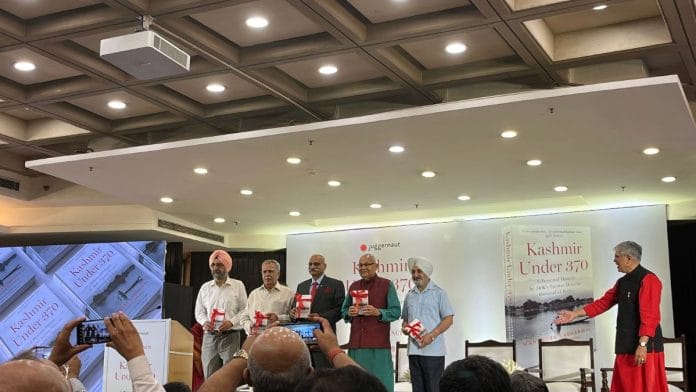New Delhi: Jammu and Kashmir’s first Director General of Police, Mahendra Sabharwal’s foremost regret is that he and his late wife couldn’t fulfill a longstanding desire — that of purchasing land in their “adopted homeland” of Kashmir. Now, thanks to the abrogation of Article 370, they can.
The launch of the IPS officer-turned-author’s first book, published by Juggernaut and titled Kashmir Under 370: A Personal History by J&K’s Former Director General of Police, was an ode to the revocation of the state’s special status. The call is no longer contentious. Courtesy of the abrogation, the state is no longer an incubator for terrorists and a hotspot for militancy. In fact, according to the other DGPs, with whom Sabharwal was in conversation — militancy has come to a near halt. And none of those who remain are homegrown. They’re all foreigners, either from Pakistan or Afghanistan.
“Separatist thinking, which is currently almost dead, will soon be buried,” said Farooq Khan, former inspector general of police in J&K and current member of the BJP.
According to Sabharwal, the Indian government, up until 2019, had a nebulous strategy in place — for decades, ‘soft separatism,’ was used as “a profitable local strategy”. He cited it as one of five reasons responsible for undermining Kashmir’s peace and prosperity. The other reasons were cold war geopolitics, ‘radical Islam’, fraught federalism — and what appeared to be the panellists’ and the audience’s favourite topic — Pakistan.
“Kashmir today is at a critical juncture. It’s peaceful, and we’re seeing a record number of tourists. But at the same time, soldiers have been martyred,” said Dilbag Singh, former J&K DGP, who held the post at the time of abrogation. “Pakistan is doing mischief. Not one local militant has been seen.”
Sabharwal and the panellists seemed to view Islam through two distinct binaries. One is a heavily romanticised ‘Sufi Islam,’ while the other is ‘radical Islam’. Kashmiris and Kashmiriyat are typically associated with the former, but extremism became attractive, and Kashmir changed. Other than the rise of social media as a channel through which militant ideology and Pakistani terrorists are more accessible, no concrete reason was given for this shift.
There was a sense of pride with which all four former DGPs spoke — the worst, bloodiest parts of Kashmir’s history have come to an end. However, there is still room for improvement and the need for the people to be integrated with the rest of India and experience the same kind of kinship. And the abrogation was a leap in the right direction, they all agreed.
Also read: SC advocate’s book on Kashmir suggests going to ICJ, receives support at launch event
Remarkable achievement
Other than the supposed onset of peace, the discussion consisted primarily of Pakistan-bashing. It was referred to as the only country in the world that negotiates with “a gun to its own head.” The all-powerful Pakistani army was anointed as “the only army with a country”. The state of its economy was criticised, with a couple of audience members even jeering at references to its inferior economic position and global standing.
Ajay Bisaria, formerly India’s High Commissioner to Pakistan was also in the audience. “India’s move [the abrogation] plunged Pakistan into confusion. They couldn’t anticipate it, and thought it’d be a minor tinkering,” he said. “They tried the military option, and to internationalise the issue. But all they could do was kick out the high commissioner.”
He also called the abrogation of Article 370 “a remarkable achievement.”
Amid the derision and the sneers, there was a narrow window in which the Indian State was criticised. The moderator of the discussion, Sabharwal’s son Manish, recounted how Farooq Khan as DGP was given contradictory instructions from the central government. One day he’d be told to arrest Kashmiri separatist leader Yasin Malik. Next, he’d be told to give him security.
The room in Delhi’s India International Centre (IIC) appeared to comprise only staunch supporters of the Modi government’s move. A single audience member referred to the abrogation as unconstitutional. Another, while acknowledging that the state remained heavily militarised, lamented an uncle’s difficulty in purchasing land in Pahalgam.
(Edited by Ratan Priya)






